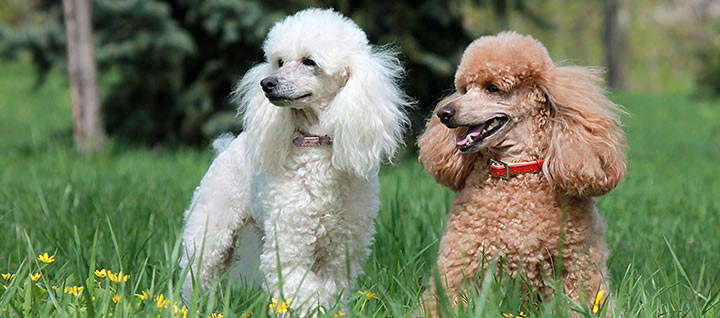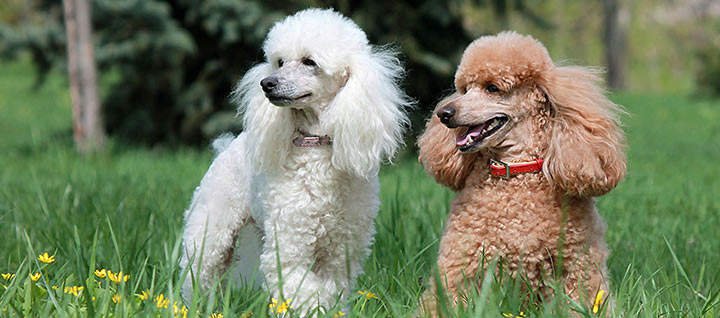When it comes to finding a hypoallergenic dog breed, the toy poodle may not be the first one that comes to mind. However, you may be surprised to learn that toy poodles are indeed hypoallergenic. This small and elegant breed is known for its curly and dense coat, which doesn’t shed as much as other breeds. So, if you or someone in your family suffers from allergies, a toy poodle might be the perfect furry companion for you.
The toy poodle’s hypoallergenic nature can be attributed to its coat. Unlike many other breeds, toy poodles have hair instead of fur. Hair grows continuously, similar to human hair, which means it doesn’t shed as much dander and allergens. This significantly reduces the likelihood of triggering allergic reactions in sensitive individuals. Additionally, toy poodles have minimal dander, which is another major factor in causing allergies. So, if you’re looking for a dog that won’t leave your allergies acting up, a toy poodle is an ideal choice.
Toy poodles are hypoallergenic dogs, making them a great choice for individuals with allergies. These small and intelligent dogs have hair rather than fur, which reduces the amount of dander they produce. Additionally, toy poodles have a single-layered coat that doesn’t shed excessively. While no dog is completely hypoallergenic, toy poodles are known to cause fewer allergic reactions compared to other breeds. Regular grooming and proper hygiene can further reduce allergens.

Are Toy Poodles Hypoallergenic?
Toy Poodles are a popular breed of dog known for their intelligence, agility, and adorable appearance. For prospective dog owners with allergies, one of the main concerns is whether or not the Toy Poodle is hypoallergenic. In this article, we will explore the topic of whether Toy Poodles are hypoallergenic and what that means for people with allergies.
Understanding Hypoallergenic Dogs
In order to determine whether or not a Toy Poodle is hypoallergenic, it’s important to first understand what hypoallergenic means in the context of dogs. A hypoallergenic dog breed is one that is less likely to cause allergic reactions in individuals with allergies. This is because hypoallergenic breeds produce fewer allergens, such as dander, which is the main cause of allergic reactions in humans.
While no dog breed is completely allergen-free, hypoallergenic breeds like the Toy Poodle are known for producing fewer allergens and causing fewer allergic reactions in sensitive individuals. However, it’s important to keep in mind that individual allergies can vary, and what works for one person may not work for another.
Why are Toy Poodles Considered Hypoallergenic?
Toy Poodles are considered hypoallergenic because they have a curly, non-shedding coat. Shedding is the main way that allergens, such as dander, are spread around the home. Non-shedding breeds like Toy Poodles produce less dander, reducing the presence of allergens. Additionally, their curly coat helps to contain any dander that is produced, further reducing the risk of allergic reactions.
The coat of a Toy Poodle requires regular grooming and maintenance to prevent matting and ensure that it stays clean and healthy. Regular brushing, bathing, and trimming can help to minimize loose hair and dander, making the Toy Poodle even more suitable for individuals with allergies.
Tips for Allergy-Prone Individuals
While Toy Poodles can be a great choice for individuals with allergies, it’s still important to take precautions in order to minimize the risk of allergic reactions. Here are some tips for allergy-prone individuals who are considering getting a Toy Poodle:
- Keep the home clean and free of allergens by regularly vacuuming and dusting.
- Provide the Toy Poodle with regular grooming and hygiene care to reduce loose hair and dander.
- Designate certain areas of the home as “dog-free” zones to create allergen-free spaces.
- Consider investing in an air purifier to help remove allergens from the indoor air.
- Wash bedding and toys regularly to remove any allergens that may have accumulated.
Other Factors to Consider
While Toy Poodles are generally considered hypoallergenic, it’s important to consider other factors that may contribute to allergies. Some individuals may be allergic to saliva, urine, or even certain proteins found in a dog’s skin. It’s always a good idea to spend time with a Toy Poodle before bringing one into your home to see how you react and whether or not you experience any allergic symptoms.
Furthermore, it’s important to note that allergies are not solely determined by the breed of dog. Other factors such as individual sensitivity, exposure, and overall health can also play a role in the development and severity of allergic reactions. It’s always best to consult with a healthcare professional if you have concerns about allergies.
Conclusion
While Toy Poodles are considered hypoallergenic due to their non-shedding coat and lower production of allergens, it’s important to remember that individual allergies can vary. It’s always recommended to spend time with a Toy Poodle before bringing one into your home and to take necessary precautions to minimize allergens in the environment. If you have severe allergies, it may be best to consult with a healthcare professional before getting a dog.
Key Takeaways: Are Toy Poodles Hypoallergenic?
- Toy poodles are considered hypoallergenic dogs.
- They have hair instead of fur, which reduces shedding and dander.
- People with allergies may still react to toy poodles, but their symptoms tend to be milder.
- Regular grooming and cleaning can further minimize allergens in toy poodles.
- It’s important to spend time with a toy poodle before deciding if it’s hypoallergenic for you.
Frequently Asked Questions
The following are some commonly asked questions about toy poodles and their hypoallergenic nature.
1. Are toy poodles hypoallergenic?
Yes, toy poodles are considered hypoallergenic dogs. This means that they are less likely to cause allergies or trigger allergic reactions in individuals who are sensitive to pet dander. Toy poodles have hair-like fur instead of traditional dog fur, which means they shed minimally and produce less dander.
However, it’s important to note that no dog breed is completely hypoallergenic. There are varying degrees of allergenicity within each breed, and individual allergies can differ. While toy poodles are generally well-tolerated by people with allergies, it’s recommended to spend time with the breed before committing to having one as a pet to ensure compatibility.
2. Do toy poodles require special grooming to maintain their hypoallergenic nature?
Yes, maintaining the hypoallergenic nature of toy poodles requires regular grooming. Their hair continues to grow, similar to human hair, and doesn’t shed as much as other dog breeds. Regular grooming, including brushing and haircuts, helps prevent matting and keeps their coat clean and free from loose hair and dander.
It’s advisable to consult a professional dog groomer or learn proper grooming techniques to ensure the coat is well-maintained. Regular bathing with hypoallergenic dog shampoos can also help reduce the amount of allergens present on the dog’s skin and coat.
3. How do toy poodles affect people with allergies?
Toy poodles, with their minimal shedding and low dander production, are generally well-tolerated by people with allergies. However, it’s important to remember that different individuals may have varying sensitivities to allergens. Some individuals may still experience allergies or allergic reactions even with hypoallergenic dog breeds like toy poodles.
If you or someone in your household has allergies, it’s recommended to spend time with a toy poodle before bringing one home as a pet. This will help ensure that you can tolerate the dog’s presence and it doesn’t trigger any allergies.
4. Are toy poodles suitable for people with severe allergies?
While toy poodles are considered hypoallergenic, individuals with severe allergies may still experience allergic reactions. It’s essential to consult with a healthcare professional or allergist to determine the feasibility of having a toy poodle as a pet.
Some individuals may require stricter measures to manage their allergies, such as medication or specialized cleaning routines. The severity of the allergy and individual tolerance must be taken into consideration before deciding to bring a toy poodle into a household with severe allergies.
5. What other factors should be considered when choosing a hypoallergenic dog like a toy poodle?
Aside from their hypoallergenic nature, there are other factors to consider when choosing a toy poodle as a pet. Toy poodles are known for their intelligence, affectionate nature, and adaptability to different living situations. They require regular exercise, mental stimulation, and social interaction.
Additionally, it’s crucial to ensure that you have the time, resources, and commitment to provide proper care, training, and veterinary attention for your toy poodle throughout their life. Owning a dog, regardless of breed, is a long-term responsibility and should be thoroughly considered before making a decision.

Are poodles hypoallergenic? Tips for pet allergy sufferers!
In summary, toy poodles are considered hypoallergenic, which means they are less likely to cause allergies in people
This is due to their minimal shedding and low dander production, making them a suitable option for individuals with allergies
